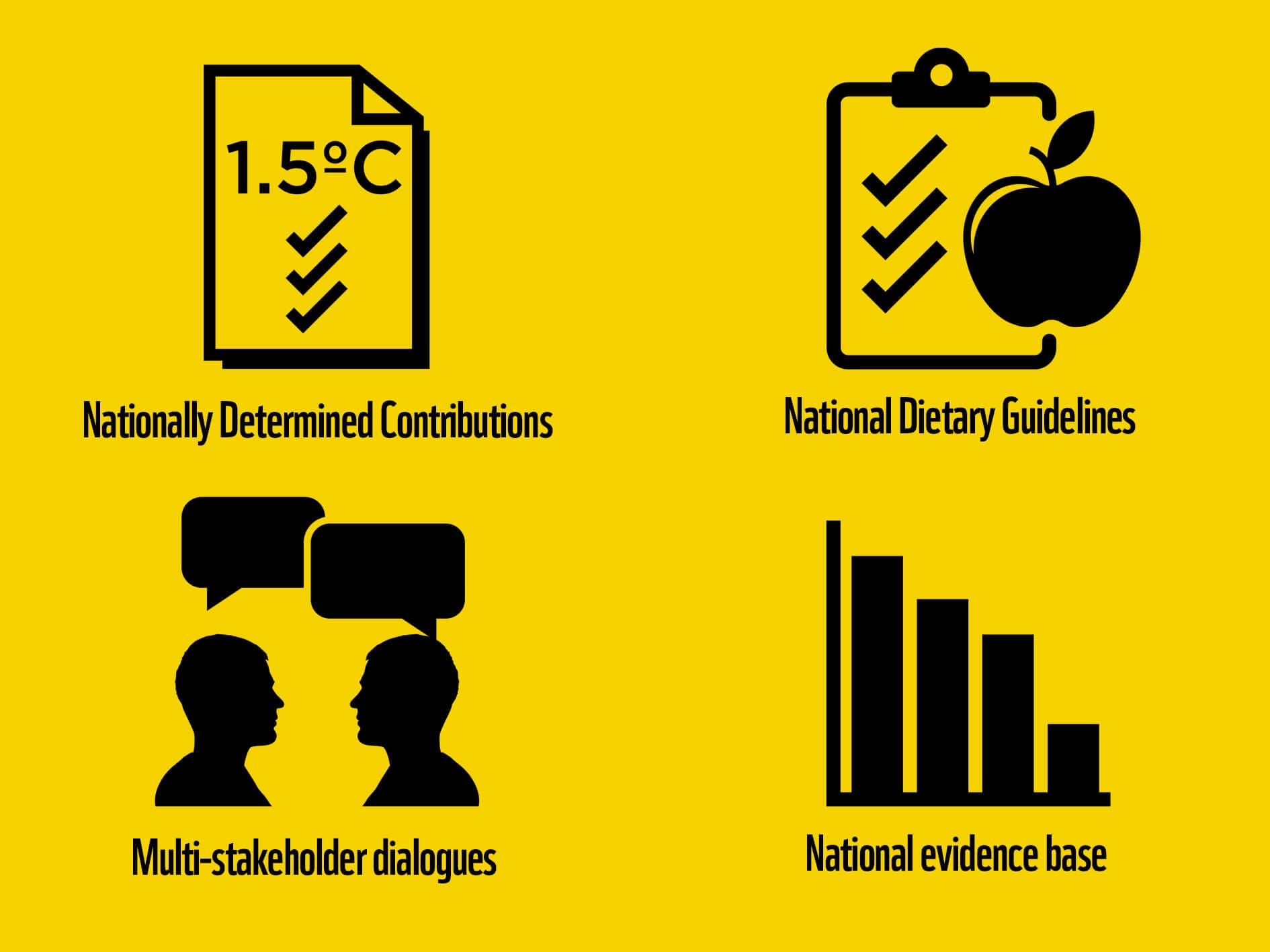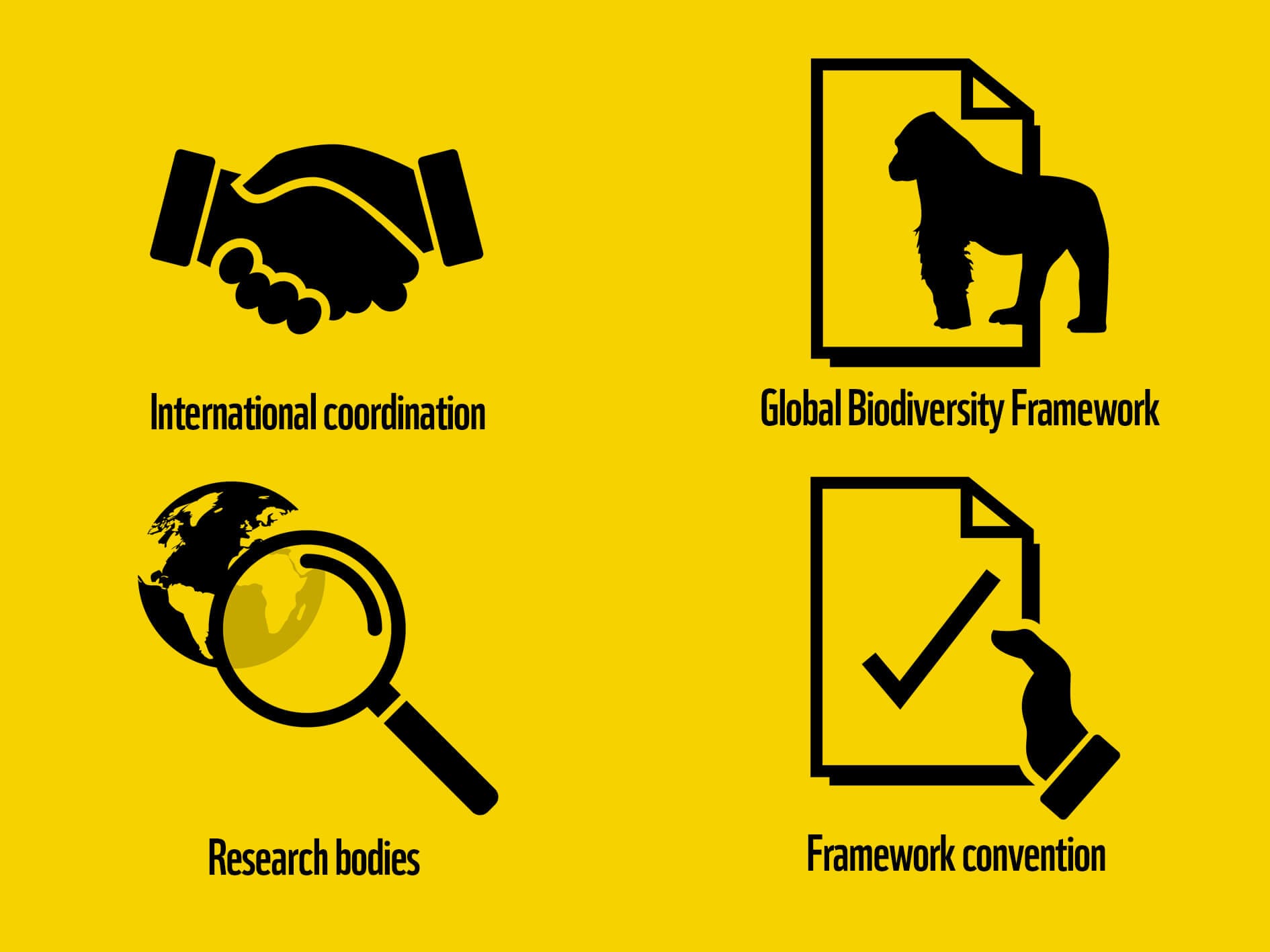
Policy
A full range of policy tools are needed to achieve dietary shifts and drive progress on the five strategic actions
National Level

Incorporate diets into Nationally Determined Contributions (NDCs)
All countries that have signed the Paris Agreement must revise and communicate their NDCs at the United Nations Framework Convention on Climate Change COP26. As of September 2020, not a single NDC included actions on dietary shifts, despite their clear climate change mitigation potential. Governments need to integrate food systems into their climate commitments, and set specific targets for sustainable diets.
Commit to raising the ambition of National Dietary Guidelines (NDGs)
The current NDGs of most countries will only lead to a slight reduction of environmental impacts and in some cases may even lead to an increase. There is a need for all countries to raise the level of ambition in their NDGs to ensure they are in line with global health and environmental targets. We urge countries to:
- Immediately review and update existing NDGs or develop new NDGs that integrate human health and environmental sustainability goals.
- Assign shared responsibility for updating existing NDGs to the Ministries of Health and Ministries of Environment or Agriculture, or their associated agencies.
- Ensure updated NDGs are developed by an independent scientific body and are free from industry influence.
- Integrate NDGs into environmental policy frameworks including the Post-2020 Global Biodiversity Framework and Sustainable Development Goals.
Initiate national level multi-stakeholder dialogues on healthy and sustainable diets
National policymakers should initiate multi-stakeholder national level dialogues to discuss and explore the implications of bending the curve on their food system using the five strategic actions. The private sector and civil society should also be included in these dialogues to ensure that the full range of levers and capacities of experts in a country are used in mapping ambitious dietary transition pathways.
Curate the evidence base for your country
Use the Planet-Based Diets Impact & Action Calculator to help curate the evidence base for your country. The tool allows stakeholders to determine national-level environmental and health impacts for various diets, tailored to a specific country or region. Diets can be customized by setting daily intake levels of 13 food groups, with guidance of an optimal intake range for an average citizen, and see results of these choices on various environmental and health indicators.
Develop and implement ambitious national pathways for food systems transformation
At the 2021 UN Food Systems Summit more than 100 countries outlined national pathways for food systems transformation. All countries need to develop their own pathways, ensuring their is a high-level of ambition and that systems-based actions are taken - across production, consumption and food loss and waste. The pathways need to be strongly implemented and must include measurement and accountability frameworks.

Multilateral Actions

Facilitate international coordination of efforts
Transforming the way we produce and consume food will require unprecedented global partnership and coordination. The only way we can bend the curve on the negative impacts of our current food systems to achieve healthy and sustainable diets for all people, is through coordinated global action.
Building on the UN Food Systems Summit, held in 2021, countries must continue to collaborate through action coalitions. Other platforms, such as the Global Action Platform on Sustainable Consumption & Diets provide collaborative spaces for non-state actors.
Incorporate diets into the Post 2020 - Global Biodiversity Framework and National Action Plans
As countries deliver the Post-2020 Global Biodiversity Framework under the United Nations Convention on Biological Diversity, they need to make a more robust and binding commitment to slow down and reverse biodiversity loss. We cannot bend the curve on biodiversity loss unless dietary shifts are considered and incorporated into new treaties and agreements post-2020. Hence, WWF is calling for healthy and sustainable diets and their impacts to be integrated into the Post 2020 – Global Biodiversity Framework and resulting national action plans.
Establish global research coordination bodies for food systems
An international coordination of efforts requires a champion, or a group of champions, to highlight the narrowing gap between scientific evidence and policy-making. A new oversight body or bodies might be needed to conduct scientific research. An international body specifically focusing on healthy and sustainable diets could also play a key role in curating evidence to build a global agenda on diets.
Develop Framework Convention on Food
A new framework convention, agreement or treaty for food is necessary to spur commitments and hold countries legally accountable to these commitments. A “UN Framework Convention on Healthy and Sustainable Food Systems” could help organize commitments while leaving national level strategies for transforming food systems up to individual countries. The agreements negotiated by such a Framework Convention on Food would need to be informed by a scientific body of experts on healthy and sustainable diets.